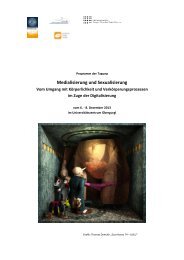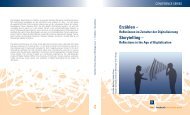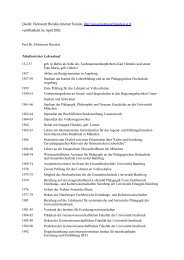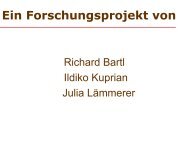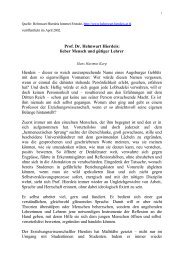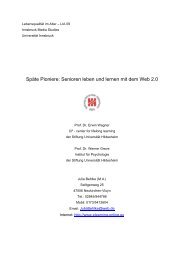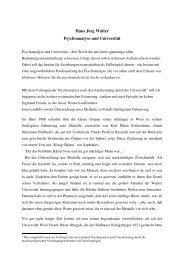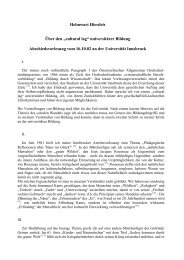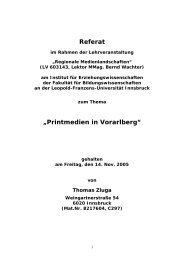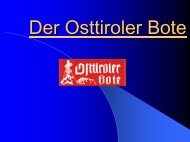Download pdf - Universität Innsbruck
Download pdf - Universität Innsbruck
Download pdf - Universität Innsbruck
Erfolgreiche ePaper selbst erstellen
Machen Sie aus Ihren PDF Publikationen ein blätterbares Flipbook mit unserer einzigartigen Google optimierten e-Paper Software.
66 Magnus Lawrie<br />
the ‘Cross-Cultural Partnership Template’. This formula to enhance co-operation, is<br />
grounded in open source principles (The Cross-Cultural Partnership, 2011). Now at version<br />
3.0, the document remains under development. This is hardly a weakness, but instead<br />
an invitation to contribute by sharing experiences in its actual use. The agreement is an<br />
example of free software culture applied in ways that, if adopted, may constructively<br />
shape the experiences of individuals in co-operating groups. With its emphasis on social<br />
interaction, its relevance for research projects should be clear.<br />
The Cross-Cultural Partnership Template concerns itself with value and mutuality in projects<br />
and partnerships and it offers solutions which recognize the worth of free software’s<br />
culture of sharing. Open-Bibliography, a public interface between literature and free software,<br />
has evolved through using many of the co-operative processes implicit in the Cross-<br />
Cultural Template. Such projects should be significant to the emerging academic discipline<br />
of Electronic Literature, in the way they draw on free software modes of reciprocity<br />
and combine with institutional critique which, “...does not oppose the institution, but …<br />
does flee from institutionalization and structuralization” (Raunig & Ray, 2009, xvii). Understanding<br />
these forms (of organization, exchange and creative refusal) means also to<br />
recognize that, “No more than philosophy or science, literature is not an institution among<br />
others; it is at once institution and counter-institution, placed at a distance from the institution,<br />
at the angle that the institution makes with itself in order to take a distance from<br />
itself, by itself” (Derrida in Morgan Wortham, 2006, p. 13). Raunig sees, “...contemporary<br />
forms of institutional critique: transformations as ways of escaping from the arts of governing,<br />
lines of flight, which are not at all to be taken as homeless or individualistic or<br />
escapist and esoteric, even if they no longer allow dreaming of an entirely different exteriority”<br />
(2005, p. 5). This view, in conjunction with Derrida’s challenge to ‘counter-think’<br />
the institution may be a vital approach to making and maintaining the connections between<br />
university E-Lit programmes and the plethora of organizations (self-organized, self-instituted<br />
forms) that make and feed digital literary life.<br />
References<br />
Acquia (2011) White paper: The Path to Drupal. Available at http://acquia.com/<br />
resources/whitepapers/path-to-drupal [Accessed 8 October 2011].<br />
A-N (2011) Ladders for development: Impact of Arts Council England funding cuts on<br />
practice-led organisations. Available from: http://www.a-n.co.uk/research/article/<br />
1300054/1224267 [Accessed 10 October 2011].<br />
BBC (2011) EU austerity drive country by country. Available from: http://www.bbc.co.uk/<br />
news/10162176 [Accessed 10 October 2011].



